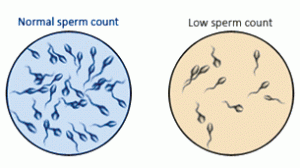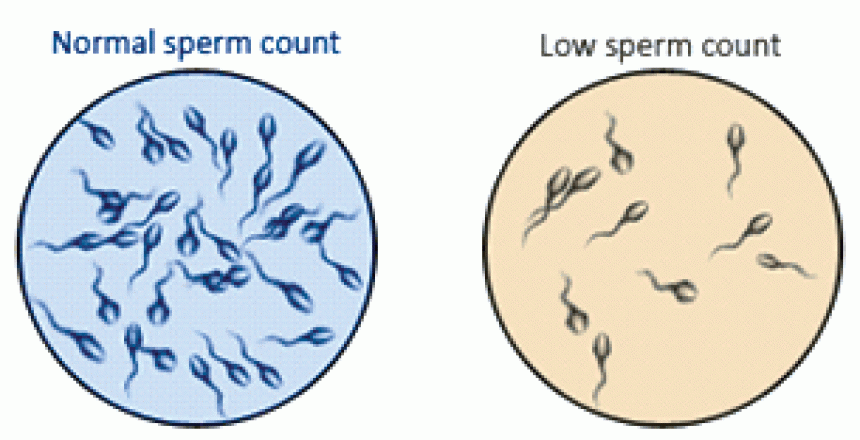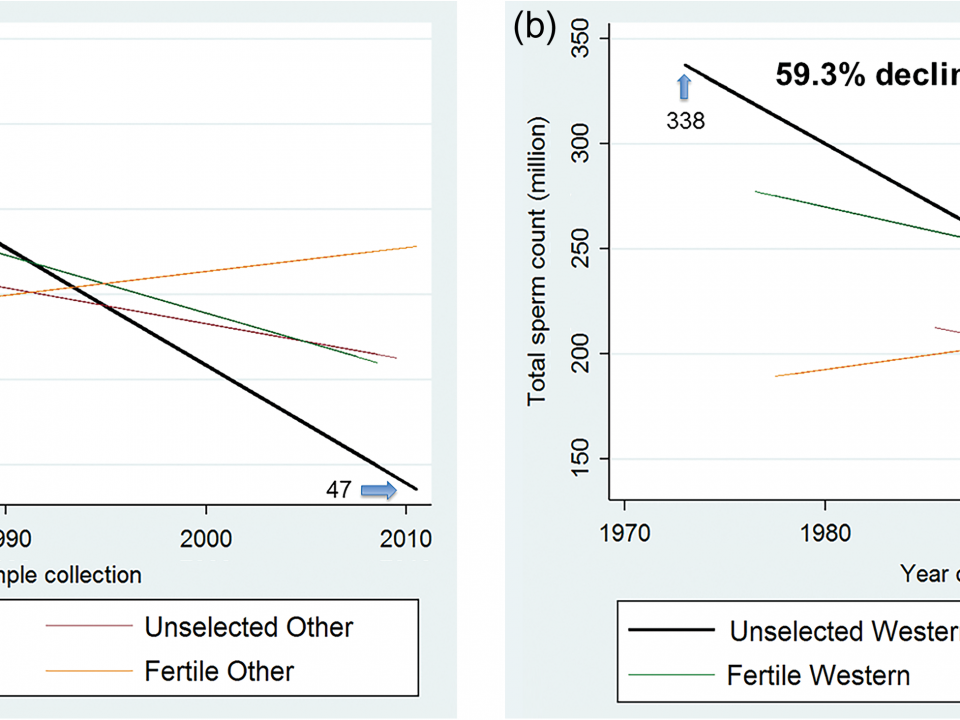
Lifestyle factors, such as diet, exercise, and sleep, influence many aspects of our physiology, including sperm production. Lifestyle impact and the biology of the human scrotum
The possession of a scrotum to contain the male gonads is a characteristic feature of almost all mammals, and appears to have evolved to allow the testes and epididymis to be exposed to a temperature a few degrees below that of core body temperature. Analysis of cryptorchid patients, and those with varicocele suggest that mild scrotal warming can be detrimental to sperm production, partly by effects on the stem cell population, and partly by effects on later stages of spermatogenesis and sperm maturation. Recent studies on the effects of clothing and lifestyle emphasize that these can also lead to chronically elevated scrotal temperatures. In particular, the wearing of nappies by infants is a cause for concern in this regard. Together all of the evidence indirectly supports the view that lifestyle factors in addition to other genetic and environmental influences could be contributing to the secular trend in declining male reproductive parameters. The challenge will be to provide relevant and targeted experimental results to support or refute the currently circumstantial evidence.
As this article notes, there’s a secular trend in declining male reproductive paramaters (1), including a very large increase in testicular cancers, declining sperm counts, and declining testosterone levels (2). I doubt if many people at all are much aware of these things, especially the rising rate of testicular cancer. In the U.S. alone, “the overall age-related incidence of testicular and germ cell cancer has increased 3.5-fold during the past 60 years.” In Europe, cases of testicular cancer are increasing at an annual rate of from 2 to 5%. Almost sounds like an epidemic to me.
Besides all this, congenital malformations of the male genital tract are increasing.
What could be causing all this? Possibly higher exposure to estrogens. (3) We are exposed to these largely through chemicals in the environment. Quote:
We have proposed that these conditions often may be part of a testicular dysgenesis syndrome (TDS), which may also include poor spermatogenesis and impaired Leydig cell function. According to our current thinking genetic as well as environmental factors must be taken into account. There is strong evidence from experimental animal studies and investigations of wildlife populations that fetal exposure to endocrine disrupters, including phthalates, brominated flame retardants, bisphenol A and PFAS (perfluoralcylated chemicals), can cause TDS like conditions in animals. Humans are exposed to the very same agents through modern lifestyle. (4)
From the first article above on lifestyle factors and male biology, we have this:
Normal scrotal temperature (the external surface of the scrotum) is approximately 34°C in a normally clothed man walking about or maintaining a loose stance, and it has been estimated that testicular temperature within the scrotum is between 0.1 and 0.6°C higher than this [32,35,36]. Clothing itself appears to contribute about 0.5–1.0°C [37], compared to being naked. Clothed and sitting down with thighs apart raises scrotal temperature to about 35 C, whereas sitting with thighs together quickly allows scrotal temperature to rise to above 36 C, i.e. to abdominal temperature within the testis [36]. Several studies have now shown that men with predominantly sedentary occupations [36], or who spend considerable time driving a vehicle [38,39], have higher average scrotal temperatures and consequently lower average sperm production or reduced fertility.
This gives scientific cred to the manosphere observation that a man should not sit with his legs crossed, since it makes him appear less manly and less confident. According to this article, sitting legs crossed may literally make one less of a man, if by that we include measures of sperm production.
Don’t wear skinny jeans, as if you didn’t have reason enough already not to wear them. This also gives new impetus to the use of standing desks.
I’m being perfectly serious about the skinny jeans and these other lifestyle factors. What about the environmental chemicals that may cause declining sperm counts and testosterone, and increased testicular cancer? Perhaps the best thing would be to try to avoid endocrine disrupters:
A wide range of substances, both natural and man-made, are thought to cause endocrine disruption, including pharmaceuticals, dioxin and dioxin-like compounds, polychlorinated biphenyls, DDT and other pesticides, and plasticizers such as bisphenol A. Endocrine disruptors may be found in many everyday products– including plastic bottles, metal food cans, detergents, flame retardants, food, toys, cosmetics, and pesticides.
That means, for one thing, eating real, minimally processed food that does not come in plastic or cans. That goes for drinks too, which usually come in plastic bottles or cans. Drinking bottled water would seem to be counter-productive; get a home water filter for your drinking water. (And make your ice from filtered water too.) Cosmetics, such as deodorants or scents, should probably be considered as suspect until you know otherwise. (My container of unscented deodorant at home says it is “aluminum and paraben free”, and the list of ingredients appears to contain no endocrine disruptors.) Any household or personal product that is scented is suspect as well.
There’s some evidence (5) that n-acetylcysteine can improve semen parameters, such as volume. Vitamin C may have the same effect. (6) (See my recommended supplements page.)
Male reproductive health including lack of cancer, testosterone levels, and sperm counts all go together, so even if you’re not interested in becoming a father, it would pay dividends to be aware of all this and to put avoidance of endocrine disruptors (and skinny jeans) into practice.










8 Comments
Read your book again. Thanks for the advice. Instead of supplements, I’m obtaining my vitamins and minerals through food.
Two inquiries:
1) What is the long-term effect of drinking too much alcohol? I’m 26 and I drink >10 drinks per week;
and 2) interesting study you might like: https://www.kurzweilai.net/a-step-toward-a-potential-anti-aging-drug
Michael, reports have it that 2 drinks a day for a man is fine, so as long as you don’t drink those 10 drinks in 1 or 2 nights, it’s likely OK. Everything I know says that moderate drinking is associated with better health.
Interesting to know.
Regarding drinking water from the tap: a while back I had read that there were rising levels of estrogen in the water supplies due to all the women on the pill. If this is still a valid concern, the question is which is worse: the endocrine disrupters in the plastic of bottled water or the estrogen levels in the drinking water (as low as they may be)?
what does a woman on the pill have to do with water supplies?
The drugs are not detoxified by the woman’s body, in stead they are excreted in urine, and find their way into the water supply. Unless you live at the very top edge of a watershed, higher elevation communities are dumping their treated wastewater into rivers which eventually is used by other communities.
“According to this article, sitting legs crossed may literally make one less of a man, if by that we include measures of sperm production.”
Manspreading, doctor’s orders…
Great stuff on endocrine disruptors! I stopped using shampoo altogether and replaced spray deodorant with a crystal one (baking soda works too). Toothpastes also contain this crap, oil pulling or activated charcoal works great instead.
Watched “Lucy” recently and Morgan Freeman’s character (a professor) was explaining how in a good environment an organism will reproduce and in a harsh environment it will choose longetivity instead. I wonder if sex/porn can actually be pro aging, since your genes have been passed so from evolution’s pov there’s less reason for longetivity.